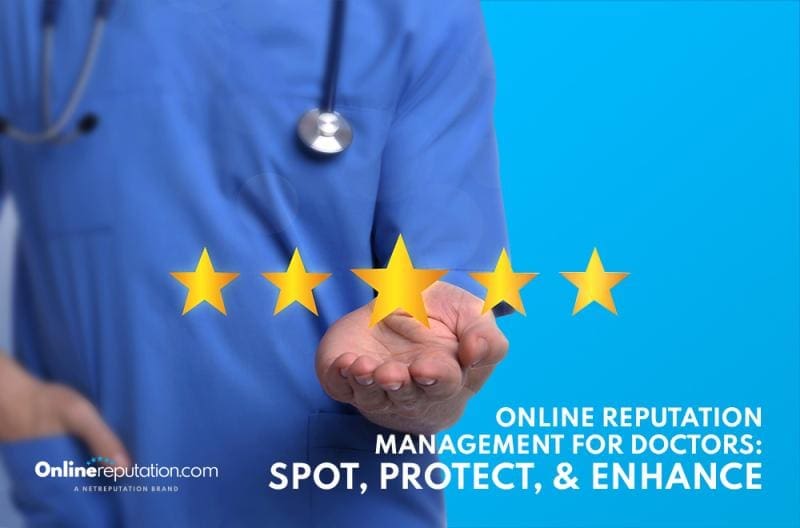
So you’re a doctor and you’ve spent years in school perfecting your craft. You help people in your community stay healthy and live better lives. But have you given much thought to what patients might find when they Google your name? In today’s digital age, your online reputation matters.
According to surveys, over 70% of patients research their doctors online before choosing one. That means if there are more negative reviews and ratings about you than positive ones, it could seriously impact your business and credibility.
The good news is, you have the power to take control of how you appear online. By making a few simple changes to your online profiles, optimizing positive content, and addressing unfair reviews professionally, you can ensure that your dedication and expertise as a physician shine through on the web. Read on to find out how.
The Importance of Online Reputation for Physicians
For physicians, your online reputation is vital. According to a study by Software Advice, 65% of patients search online reviews to evaluate doctors, and over 70% trust online reviews as much as personal recommendations. As more patients turn to the internet to find and vet doctors, your online presence shapes their first impression and influences their decision to schedule an appointment.
Monitor Your Online Reviews and Mentions
Set a Google alert for your name and practice to receive real-time notifications anytime you’re mentioned online. Check review sites like Health grades, Vitals, or other platforms regularly for new reviews. Respond promptly to both positive and negative reviews – thank happy patients and address critical ones professionally and empathetically. Your caring responses reassure patients you value their feedback.
Optimize Your Online Profiles
Claim and update profiles on sites where patients search for physicians like Healthgrades, Vitals, and your practice’s website. Include a professional headshot, your credentials, insurance participation, and a friendly welcome message highlighting your experience and approach to patient care. Keep all information consistent and up-to-date across sites.
Build Your Online Authority
Start an informational healthcare blog or podcast discussing common conditions you treat, healthy lifestyle tips, and the latest medical advancements. Share content on your social media profiles and comment on industry news and medical organizations you follow. Engaging with patients and peers establishes your authority and expertise. Over time, this content will rank higher in search results, strengthening your online reputation.
Online reputation management for physicians requires ongoing effort and monitoring. However, by staying active and engaged on the digital front, you gain more control over your online narrative and build valuable trust and credibility with patients in an increasingly virtual world. The benefits to your practice can be immense.
OnlineReputation.com provides healthcare-focused solutions enabling you to optimize your online presence so you can focus on what matters most – caring for your patients.
How Patient Reviews Impact a Doctor’s Reputation

As a doctor, your online reputation is critical to building trust and attracting new patients. Patient reviews on sites like Healthgrades, Vitals, and other platforms directly impact your credibility and search rankings. According to a survey by Software Advice, over 70% of patients read online reviews before booking an appointment.
Why Patient Reviews Matter
Negative reviews can damage your reputation and cost you business. Patients today have more choices than ever before, and even one or two bad experiences shared online can sway them to go elsewhere. However, positive reviews strengthen your credibility, boost local SEO, and give prospective patients confidence in your abilities.
Actively monitor review sites so you know how patients perceive your practice. Look for trends in the feedback and make improvements as needed. Respond to both positive and negative reviews in a timely, professional manner.
Thank patients for the praise and address any concerns to show you value their input. Your caring response may even persuade the reviewer to give you another chance.
Some review sites allow doctors to claim their profile and post photos or a short bio. Take advantage of these opportunities to give reviewers and searchers a more personal glimpse into your practice. Build familiarity and start shaping your reputation from the first digital encounter.
While you can’t control every review, you can influence your online reputation by providing exceptional care and service. Focus on listening to patients and meeting their needs. Make a good impression from the initial phone call through follow-up. Happy, well-cared-for patients are more likely to share their positive experiences online, helping to counterbalance the occasional negative review.
With vigilance and dedication, you have the power to take control of your online reputation. Monitor review sites regularly, respond professionally, strengthen your online presence, and double down on patient satisfaction. Your efforts will pay off through improved search rankings, greater trust, and a thriving practice.
Let OnlineReputation.com help you safeguard and build upon your hard-earned credibility so you can spend more time focused on your patients.
Monitoring Your Online Presence and Search Results
As a doctor, your online reputation is critical to building trust in your practice and attracting new patients. Monitoring what information about you and your practice appears in search engines and review sites should be an important part of your marketing strategy.
Search Your Name Regularly
Search for your full name, as well as the name of your practice, on Google and other major search engines at least once a month. Look for new reviews, social media mentions, news articles, or other content referencing you or your services. Check that information like your practice address, contact details, and specialties are up to date across all listings. Monitor for any negative reviews or complaints and address them promptly.
Claim and Optimize Your Profiles
Make sure you have a Google My Business, claim Google business listing for your practice, and that the information is complete and consistent across the web. Claim and optimize profiles on sites like Healthgrades, Vitals, and RateMDs. Provide details like your education, experience, awards, and patient satisfaction scores to build credibility. Ask happy patients to leave reviews on these sites to push down negative ones.
Be Active on Relevant Platforms
Have an active social media presence on platforms where your patients and potential patients are engaging, like Facebook and Instagram. Post regularly about health topics, events at your practice, staff updates, or personal interests to increase visibility and connect with your audience. Link to your profiles from your practice website. Engagement from followers can also help improve your search rankings.
Address Negative Reviews and Complaints
Respond promptly to any negative online reviews, complaints, or comments about your practice. Address the issues raised respectfully and professionally, take responsibility where needed, and highlight steps taken to resolve problems or improve service. Your responses, and whether or not the original posts are updated or removed, can impact your online reputation and search standing.
With consistent monitoring and optimization of your online presence, you can build a reputation that establishes you as a trusted physician, increases patient loyalty, and helps your practice thrive. Make it a habit to search for yourself regularly and be proactive in managing what people find when they search for you online.
Strategies to Improve Your Online Reputation

As a doctor, your online reputation is critical to building trust and credibility with patients. Fortunately, there are several effective strategies you can implement to improve how you are perceived online.
Monitor Your Online Presence
Actively monitor reviews and mentions on sites like Health grades, WebMD, or other platforms. Set up alerts to notify you whenever your name or practice is posted online. This allows you to address any negative comments quickly and directly before they damage your reputation. Respond to all reviews, positive or negative, to show you value patient feedback.
Focus on Patient Experience
A good experience translates into positive reviews and word-of-mouth promotion. Exceed patient expectations by focusing on the human aspects of care like communication, empathy, and compassion. Educate your staff on the importance of patient experience and empower them to resolve issues. Solicit feedback to better understand patient needs and make improvements.
Build Your Online Authority
Establish yourself as a trusted source of health information through social media platforms, online videos, webinars, articles, and more. Share informative content to showcase your expertise and valuable insights. Promoting wellness and disease prevention are excellent ways to build goodwill.
Participate in relevant LinkedIn groups and engage by posting and commenting. Over time, this helps strengthen your credibility and authority.
Promote Your Online Reputation
Once you have a strong presence established, promote your online reputation through your website, email newsletters, social media, and word-of-mouth. Ask happy patients to leave reviews on sites where you need more visibility. You can also run a reputation management campaign to improve search rankings for positive content about your practice.
Partner with Professionals
For the most comprehensive solution, consider partnering with reputation management professionals. Companies like OnlineReputation.com offer integrated services to optimize and protect your online reputation. With experienced professionals dedicated to managing your digital presence, you can have peace of mind knowing your reputation is in good hands.
Focusing on patient experience, building authority, monitoring closely, and promoting your reputation are key to improving how patients perceive you online. Partnering with professionals can help take your online reputation to the next level. By actively managing your digital presence, you strengthen your credibility and build greater trust with patients.
Removing Harmful or Defamatory Content About Your Practice
Unfortunately, false or unfair reviews about your medical practice may appear online. While free speech is important, defamatory or harmful content needs to be addressed. As doctors, your reputation and patient trust is paramount.
Monitor Closely
Regularly check review sites like Healthgrades, Vitals, or other platforms, as well as search engines, for negative content about your practice. Look for reviews that criticize beyond reasonable commentary or make false claims. Save copies in case they are removed.
Send cease Letters
For defamatory reviews, consider sending a cease and desist letter to the reviewer and website requesting removal on legal grounds. Explain how the specific comments are false and damaging. Provide evidence to support your position. Cease and desist letters are often effective, as individuals and companies generally wish to avoid legal issues.
File a Lawsuit (if Necessary)
As a last resort, you may need to pursue legal action against a reviewer to have the content removed, especially if it is threatening or poses harm to your practice or reputation. Lawsuits should only be considered for the most egregious cases. Consult with a lawyer to evaluate if you have grounds for a defamation or libel claim before proceeding.
While fighting unfair reviews can seem like an uphill battle, there are paths to resolution. Staying on top of your online reputation and taking action against truly defamatory content will help limit the damage. With time and consistent high-quality service, unfair reviews will become less prominent as more positive patient commentary accumulates. Focusing on providing excellent care and customer service is the best strategy for managing your online reputation in the long run.
Leveraging Social Media to Shape Your Reputation

Social media has become an important tool for reputation management. As a doctor, establishing a social media presence and using it strategically can help shape how patients and potential patients perceive you and your practice.
Build your profiles
Sign up for the major social networks like Facebook, LinkedIn, and Twitter. Create a professional profile photo and cover image. In your bio, emphasize your credentials, experience, expertise, and the services you offer. Include the URL for your practice website.
Post valuable content
Share content that educates and informs your followers. Post links to health news, medical research, and articles on common conditions you treat. You can also post photos from events you attend or charity work you do.
This shows you are engaged and dedicated to your community. Occasionally, promote your services or highlight patient success stories. But don’t make every post a sales pitch. A good rule of thumb is 80% informational, and 20% promotional.
Engage and interact
Take time each day to connect with followers and other doctors. Like and comment on other posts. Reply to messages and comments on your posts. Thank people for follows, likes, and shares.
Join in discussions on health and medical topics. Make genuine connections by asking open-ended questions and showing interest in learning more about others.
Monitor your profiles
Keep an eye out for any reviews, comments, or posts about you that could damage your reputation. Politely and professionally respond to negative reviews, addressing the specific issues raised. Report any harassing or inappropriate content to the social network. You should also search for your name and practice on sites like Healthgrades, and RateADentist to see what patients are saying and make sure the information is accurate.
Using social media as a reputation management tool requires time and effort. But by building your profiles, sharing great content, engaging with your followers, and monitoring what’s said about you, you can shape how you’re perceived online and strengthen your reputation and authority. Physicians who embrace social media and use it strategically will have a competitive advantage over those who do not.
Responding to Negative Reviews and Feedback
As a physician, your online reputation is critically important. Negative reviews and critical comments about you or your practice can damage your credibility and turn away potential patients. The good news is, you have control over how people perceive you online. By proactively managing your online reputation, you can strengthen your digital presence and limit the impact of unfavorable feedback.
Responding to Negative Reviews
When a negative review is posted about you or your practice, don’t ignore it. Respond promptly and professionally. Thank the reviewer for the feedback and express your desire to resolve any issues.
Apologize for their poor experience and ask open-ended questions to better understand their concerns. Do not get defensive or make excuses.
Once you understand the situation, take responsibility and offer to make things right if appropriate. Explain how you will use their feedback to improve your services. Your goal is to show other readers that you take patient experiences seriously and are committed to the highest quality of care. If the review mentions a legitimate issue, also contact the patient directly to address it.
Reporting False or Defamatory Reviews
If a review is blatantly false or defamatory, you may need to report it to the review platform and consider pursuing legal means for removal. Explain specifically why the review violates their content policies so they have grounds to remove it. As a last resort, consulting an Internet defamation lawyer regarding your legal options may be necessary to protect your reputation.
While negative feedback can be upsetting, choosing to respond constructively is the wisest course of action. Address issues respectfully, make things right when needed, and work on continuous improvement. Your patients and online reputation will benefit as a result. Focus on delivering the best possible experience for every patient, and your reputation on the Internet and in the community will strengthen over the long run.
Reputation Management Services for Doctors
As a doctor, your online reputation is critically important. Patients are searching for you online, and what patients find, can have a big impact on whether to choose your practice. Unfortunately, some negative reviews or unflattering search results are inevitable. The good news is you have options for managing your online reputation and pushing down undesirable content.
Onlinereputation.com offers reputation management services tailored specifically for doctors, physicians, and healthcare organizations. We can help suppress negative reviews and press releases, improve your search rankings, and strengthen your overall online presence.
Reputation Monitoring
Reputation monitoring tools track mentions of your name and practice across the web. Such tools alert you to new reviews, social media posts, press coverage, and more so you can address issues quickly. Monitoring also provides insights into what patients and potential patients are saying about you online.
Negative Review Management
Reputation management companies, like OnlineReputation.com, have experienced unfair, misleading, or fake negative reviews being removed from sites like Healthgrades, and Google Reviews. We know how to properly report violations to get reviews taken down, without it seeming like censorship. Our experts can also help improve your star ratings by encouraging happy patients to leave positive reviews to balance out any remaining negative ones.
Search Engine Optimization
SEO involves optimizing your web content and profiles to rank higher in Google search results. Reputation management services will analyze your online footprint and make recommendations for strengthening it. This includes helping you create profiles on sites like Healthgrades, Vitals, and WebMD, optimizing your practice website, building links between your profiles, and generating new content to push down undesirable search listings.
Crisis Management
If a crisis threatens your reputation like a medical malpractice lawsuit or board complaint, reputation management companies offer crisis communication services. Our experts can help draft an official response, work to mitigate negative publicity, and implement online strategies to minimize damage. The sooner you engage crisis management help, the more effective their response can be.
Maintaining a strong, positive reputation online is well worth the investment. Reputation management services offer a multi-pronged approach to safeguarding your practice and keeping patients’ trust. With vigilance and the right strategies, you can take control of how people perceive you on the web.
Some Common Concerns About Physician Reputation Management
As a physician, you’ve invested years of education and training to build your practice. Your online reputation is critical to connecting with prospective patients and maintaining trust within your community. However, digital platforms open the door for dishonest reviews, false information, and misleading search results that undermine your credibility.
What are the most common online reputation issues doctors face?
Negative reviews – Disgruntled patients occasionally post harsh critiques on sites like Healthgrades, Vitals, and other platforms. Unchecked, these reviews can seriously damage your reputation.
Inaccurate information – Errors in your online profiles, such as incorrect practice information or areas of specialty, create confusion and erode patient trust.
Unethical search optimization – Some competitors use manipulative SEO tactics to push their listings above yours in search rankings. This diverts prospective patients away from your practice.
Privacy concerns – Patient information and personal details leaked on public platforms violate HIPAA regulations and compromise sensitive data.
Why is physician reputation management important?
Builds credibility – A strong online reputation establishes you as a reputable, trustworthy physician. Patients today often research doctors online before scheduling an appointment.
Drives new patients – High search rankings and positive online reviews help prospective patients find your practice. This can translate to increased patient volume and revenue.
Protects privacy – Strict monitoring and rapid response to privacy issues demonstrate your commitment to safeguarding patient data as required by law.
Maintains a competitive edge – As more physicians optimize their online presence, reputation management services allow you to keep pace with competitors in your area of expertise.
OnlineReputation.com partners with doctors and physicians to develop tailored strategies addressing their unique online reputation needs. Our healthcare-focused solutions are designed to strengthen your credibility, connect you with new patients, ensure privacy, and gain a competitive advantage — empowering you to focus on patient care.
Conclusion
So there you have it, doctors. With some time and effort invested in managing your online reputation, you can take control of how you’re perceived on the web. Focus on building a professional website, optimizing it for search engines, and publishing helpful content that establishes you as an authority in your field.
Monitor review sites and social media, respond to both positive and negative comments, and work to resolve legitimate patient concerns. The internet isn’t going anywhere, so make it work for you instead of against you. Your online reputation depends on it, and so do your current and future patients. Take charge today – your practice and peace of mind will thank you for it.
You might also like
Online Reputation Management for Podcasters
So you’re a doctor and you’ve spent years in school perfecting your craft. You help people in your community stay …
